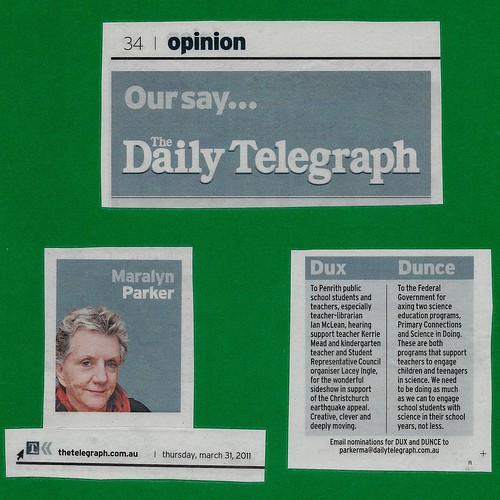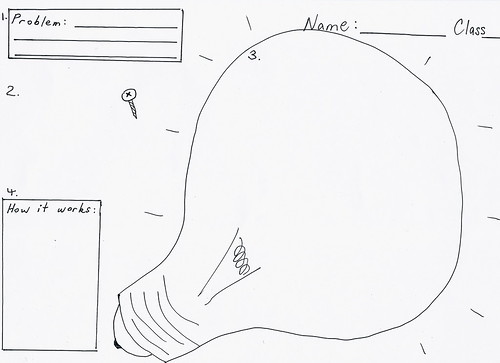The Parliamentary Inquiry into the situation of Australia’s teacher-librarians was tabled today: “Inquiry into school libraries and teacher librarians in Australian schools”. Click HERE to view it.
Category Archives: T-L role
The shortlist treasure hunt
The Children’s Book Council of Australia (CBCA) released its 2011 shortlist of nominated children’s book titles for Book Week last Tuesday, and the mad scramble – to make sure school library collections have the books – has begun in earnest.
When the stores say a shortlisted title is “not available”, that’s because it has already sold out of its initial print-run everywhere (ie. the warehouses are often empty long before the nominations come out, or they are cleaned out the day the shortlist is announced), and the publisher is now attempting to get a second printing done in time for Book Week. That attempt is usually successful, at least for the city stores in most states. Sadly, books that don’t make the shortlist often never get a second hardcover printing. That precious nomination is often their key to longevity. Publishers are very frugal and only very strong sellers and award nominees get a second bite at the market. Paperback versions of nominated hardcovers often don’t get scheduled until the approaching Christmas season, too late for Term 3 Book Week celebrations.
I have permission from my Principal to round up the titles in whichever bookshops I happen find them in, hopefully in ones that offer us a decent discount. I haven’t bought any books for the library since last Easter (except the 2010 shortlist) because of our BER rebuilding, so my 2011 shortlist shelves were totally bare. I’ve been treasure hunting shops since last Tuesday when the list came out – and I have actually found almost everything (including most of the Crichton Award nominees for first time illustrators). Often it’s the lone copy on a shelf I find, but a surprising number of the titles have been in reasonable supply this year. I resist just back-ordering the whole list from one seller at this time of year, because inevitably I see older, first printing copies in forgotten corners all over Sydney, when I could be using them with the students, but the shops also dislike it when you keep canceling books from the order. This time of year drives the booksellers crazy, and it also seems unfair to think of all those wonderful books that just missed out making it to the Notables list, since they are probably destined to be a distant memory.
So there’s no easy answer. I happen to enjoy the treasure hunt, and am usually very successful. Several of my favourite haunts see me walk in the door and they say, “Ah, we know what you’re looking for!”, even if it’s been a year between visits.
The theme this year is “One World, Many Stories”, and is neatly served by this cute song on Youtube.
Dux
Wow! Thanks Maralyn Parker and our mystery nominator!
31 March 2011: “To Penrith Public School students and teachers, especially teacher-librarian Ian McLean, hearing support teacher Kerrie Mead and kindergarten teacher and Student Representative Council organiser Lacey Ingle, for the wonderful slideshow in support of the Christchurch earthquake appeal. Creative, clever and deeply moving.”
Note that the article says “sideshow” (sic).
All Black Day: Christchurch earthquake appeal, 2011
Destination 2011: Guided inquiry
I’m off tomorrow to a teacher-librarians’ seminar on “Guided Inquiry”, presented by Dr Ross J Todd!
Teacher-librarian Lee FitzGerald, a former editor of “Scan”, is also presenting and last time I heard of her experiences trialling “Guided Inquiry” under Ross’s guidance, I went back to my school and made a point of recording more often student pre-test and post-test results and tracking the emotional side of my students’ self-evaluations, thus gaining very solid statements of the students’ analyses of their learning, in their own words.
Powerful stuff! The Kinder students who were part of a wiki project in 2007 still talk about those experiences to this day, and the Stage 3 students who did a bushrangers WebQuest in 2008, and recorded their learning on a blog, are being represented in a text book very soon!
Both of those successes occurred without the benefit of now seemingly-indispensable elements such as IWBs and the Connected Classroom. Looking forward to tackling the next stage!
Update:
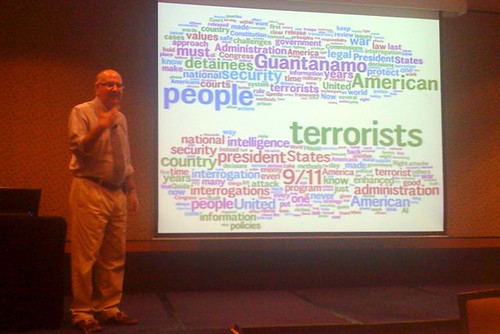
Ross J Todd presents the election speeches of
Obama and Cheney… as Wordles!
The joy of unpacking
When we last left Ian, like sands through the hourglass, so are the days of our lives…, he said, optimistically, “looks like the unpacking will be up to me (which I’m quietly pleased about, because I need to do lots of culling).”
Well, here we are at Day #2 of Project BER and things are going swimmingly. On Tuesday I wandered around my new BER library space in a daze for about two hours, tinkering here and there, unpacking a box here, having lessons in lights and door locks there, but I was able to coerce a teacher-librarian colleague to check out the job facing me and we agreed things weren’t too bad at all. But what a challenge!
The previous library was hideously overstocked and over-furnished, so looking at the bare minimum new library furnishings allocated to a school of our population, and the hundreds of cartons needing to be unpacked, was very difficult. The Principal’s first comment was that there seemed to be “lots of shelves” but I knew immediately there was much less than we’d had before. I resolved to let that panic aid in my cull. A friend commented tonight that it was appalling that a TL had to do his own unpacking, but I explained that it’s my job to do the decision-making on what I cull – and I’d much rather cull as each box is emptied, and do so methodically. There certainly won’t be enough shelves to take the full capacity of all the boxes. (We had a team of eight pro packers to pack up the old library, but it happened so fast I couldn’t cull as we went. I could barely keep up with labelling. Just imagine the mess if they had come back to unpack and only got halfway through before running out!)
I realised today that, had I tried to cull stock in the old library, I couldn’t have been this ruthless. In the new library, surrounded by the wonderful smell of newness, culling is easy. “Do I really want this old, wrinkled, stained book (that I recall borrowing at my own primary school in the 60s) on the new, pristine shelves?” Nah. Easy! Imagine if we’d received exactly the replacement furniture that we’d had before: I wouldn’t have culled much at all, and we’d end up with the same problems we’d had before.
Yesterday on my own, Junior Fiction A-C then back to teach a class of school camp leftovers. Today all day plus a trained helper, Junior Fiction D-Z and Fiction A-O, culling all the way! Good progress, methinks. The Principal has taken me off most of my teaching responsibilities for the time being, our head clerical sourced a trained library assistant for two days (to start), my regular SASS person is ducking across at every spare opportunity (library is only one-fifth of her weekly duties) and we are aiming to have the library open for Week 7, running to the usual timetable. This being Week 2 of the term, my door-to-door wandering minstrel act is finally over. This strategy will give the students their first taste of the new library before 2010 ends. Normally I’d be stocktaking the last three weeks but I’m going to try to get the disposed items noted in OASIS (and to complete a stocktake) after getting all the boxes unpacked.
I’m blissfully happy, but dusty, after a full day of drudgery that is unpacking. Books, books, books, a bear, a chook (great help, not – see above pic), and more books. Tomorrow I’m on my own again, and in the afternoon I’m back teaching the class of school camp leftovers. On Friday, my trained helper is back. Two parents have also popped in today, offering their services whenever I need it. We are getting there! Wish me luck!
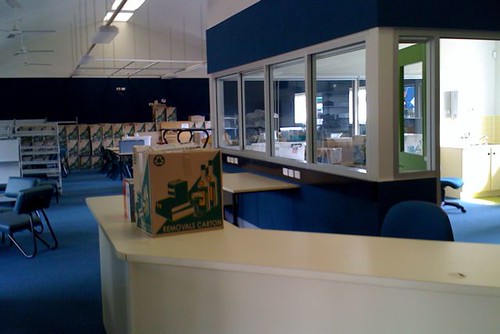
Towards the back is a small selection of the many boxes yet to be opened.
School librarians shelved by the ‘Net?
I had some good belly laughs from Network Ten’s 7pm Project‘s presentation on teacher-librarians on Friday night. The pithy segment covered the forthcoming government inquiry into Australian school libraries and the roles of teacher-librarians. As always with this kind of TV news satire, when you’re close to the issue it can be hard to see the humour, ie. knowing that some teacher-librarians have felt under fire from a naive principal, or shortsighted Departmental or political decision-making, for many years.
I hope this inquiry into the state of teacher-librarianship has positive results for all stakeholders across Australia, especially the students. NSW conditions are certainly better than in many interstate school libraries; too often, when “equity” comes into a controversial issue, we all end up with less in order to be seen to be equitable. My school’s brand new “stimulus package” library starts being built this week – our local community really hopes I’m still there to work in it when it’s finished. What’s been interesting is that we’ve been without an actual physical collection (and a venue for centralized library visits) for two months now – and yet I’m still doing cooperative planning, programming and teaching, and promoting recreational reading, going from door-to-door. My influence on all class programs is as strong as ever. The TL role is so much more than a school’s information collection, be it shelves of books or a web of Internet sites.
As James Henri rightly says on the 7pm Project‘s web page, “Information is information. Packaging is just packaging”. With the Internet, everybody gets to be their own publisher and having “experts to manage what information is required by whom and when” has never been more important. Someone needs to be showing the students (and the teachers) how to navigate the virtual information overload. I’m not sure I want to evolve into one of those IT guys whom Carrie Bickmore loathes. Teacher-librarianship is so much more (although there’s plenty of IT blood running in our veins; has been for years!).
These principals who supposedly imagine a fully electronic, futuristic school library with no books – and no trained TLs to manage that info – are really going to be in trouble when there’s a power blackout. Or when their child or grandchild wants one last picture book to be shared before bed.
I did try to leave a comment on the 7pm Project‘s web page, but some IT guy’s message was telling me I was “undefined”.
Library Blog Awards
This blog has been nominated for a Library Blog Award by readers of “Booked Inn”. (Thank you, whoever you are!)
The Library Blog Awards awards aim to publicise “the most interesting, entertaining and provocative library blogs out there”. For more information on these awards, please go to www.salempress.com/blogs.
Wish me luck!
Bright ideas – Inventions for Stage 2
Bloom’s (Revised) Taxonomy now puts “Creation” above “Evaluation”, as seen in this revised diagram.
Here’s the blackline original I created to help out Stage 2 students to finish up their science and technology unit on “Inventions”. Hopefully, the students were able to create some new knowledge, using all the essential field knowledge and skills developed by the unit:
And two completed creations:
PROBLEM: “Falling out of bed” by Maria:
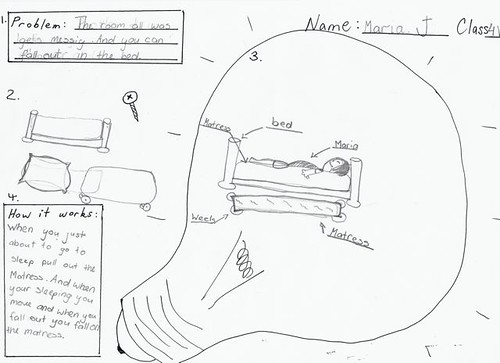
PROBLEM: “Falling off a motorbike” by John:
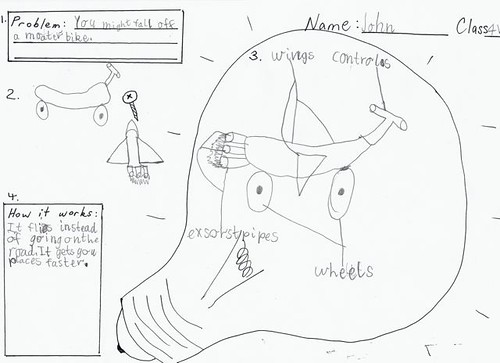
(Note the “invented spelling” of “exhaust pipes” on this one.)
Plotting, planning, packing, roving
Lots of NSW DET school libraries seem to be preparing to pack up everything for longterm (temporary) storage while their new BER libraries are built on the site of portable buildings.
That will be happening here, too, but we haven’t been given evacuation orders yet.
A teacher librarian of my acquaintance asked about the security and weather-tightness of the supplied storage container, and was worried about the condition of the books when they emerge. nd what about the potential for vandalism of the container
I say, “Why worry?”
Many, many people store their possessions in large shipping containers for years on end – and most of our imported books arrive in Australia in the same type of shipping containers, surviving three months of perilous seas and weather. If some books get damaged, well… they get damaged. I suggested they think of this whole experience as an enforced cull. If necessary, make the insurance claims and then buy new resources to replace the damaged ones. Or simply have a smaller collection.
I did a massive cull of huge, dusty old hardcover tomes (and el cheapo, yellowing, brittle, 1970s paperbacks) at a school when we converted it to OASIS from a card catalogue in the 1990s. We cleared the shelves of hundreds of books, much to my principal’s horror – and yet our borrowing rates went way up!
(In any case, if vandals want to destroy library books, they’d have a much better time waiting till the new library is built. Vandalising books in a storage container is hardly much fun. Too much like shooting ducks in a barrel.)
Think positive: visualise our wonderful new school libraries – and spend the intervening months as a roving TL, getting to know the teachers on their own turf (ie. in their own classrooms!) – and plotting and planning how to maximise the learning possibilities of the new library when it arrives.
As for me, I’m really looking forward to plotting, planning, packing and roving – sometime in 2010!
Advocacy: part of our role?
From 1991 to 2002 I was an active committee member of the Australian Library & Information Association (ALIA) – and gladly gave up many hours of personal time to attend School Libraries Section (NSW Group) meetings, ALIA NSW Branch meetings and national ALIA Renewal meetings – only leaving when I returned to classroom teaching in 2003. (Sadly for the local School Libraries Section, it did not survive the “renewal” program of ALIA, or the retirements of many of its committee. Try as we did, we couldn’t tempt too many new/young TLs to commit to advocacy from a professional association stance.)
What other strategies can TLs can use now, to make sure that we do have the ongoing/evolving support of “politicians, unions, and professional associations”? Yes, of course every student in Australia deserves equity, but has recent Australian research demonstrated that it really is the “services of a professional qualified teacher librarian” in NSW that increases student achievement of outcomes? What else can NSW TLs and their professional associations do to convince other states’ powers-that-be that they need trained teacher-librarians in every interstate school?
As I said a previous post, NSW TLs can (and do) at least send messages via our actions in schools to the people making the decisions about NSW schools. Furthermore, we can make presentations at annual NSW DET and ASLA NSW conferences, (as I have been doing these past three years since returning to teacher-librarianship – so far no interstate invitations, but I’m willing to travel). The whole point of evidence-based practice is so we can actually prove that TLs make value-added contributions to our students’ educations. Then, hopefully, we find ways to bring those successes to the attention of the other states’ stakeholders, demonstrating that they are missing out on a crucial human resource: a trained TL.
Something very dramatic does need to happen to alter the current state of play. If the advocacy load should not be on the already-overburdened NSW TL, how will the politicians and unions suddenly be convinced to take up advocacy on our behalf, especially if we decide we are simply too over-burdened to do it ourselves?
We can blow a lot of hot air their way, sure, and write lots of letters and blog entries – and the other states can gnash their teeth in jealous misery – but it is solid action research that is going to provide the evidence for change. We have a prime minister bequeathing grants for new BER school libraries – all over NSW – over the next two years. Isn’t that a strong sign of someone noticing the work of NSW TLs? (Why wasn’t the money shunted into other types of buildings?)
NSW TLs do need to commit ourselves to proving that these promising, current efforts are going to be worthwhile. Unfortunately, that’s more advocacy work for us. A lot more.

